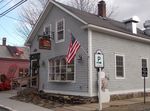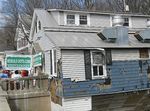Tax Credits Speed Wilmington's Recovery - Tax Credits Leverage Private Investment - Vermont.gov
←
→
Page content transcription
If your browser does not render page correctly, please read the page content below
Tax Credits Speed Wilmington’s Recovery 2018 Tax Credits Leverage Private Investment Overview The damage in Wilmington resulting from 2011’s Tropical Storm Irene was among the worst in the state with over 48 businesses flooded. Tucked in the mountains in southern Vermont, this classic skiing and recreation town is now a poster child for what can happen when people collaborate and unite around a shared goal to rebuild a devastated downtown economy. Thanks to the hard work of municipal leaders, local residents, a strong and dedicated group of second-homeowners, local foundations, businesses, private investors, and state policymakers, Wilmington’s revival is now well on its way. The Challenge In 2011, the community was struggling economically with declining population and slowing tax revenue. Irene’s flood destruction drove retail sales to new lows. Worse still, in the historic downtown, 80% of the buildings were damaged by flood waters, two were completely swept away by the raging waters, and every business was forced to close. Although some businesses began to re-open in the coming months, others closed for good. With so many vacant or severely damaged buildings the cost to rebuild was difficult to comprehend. In addition to structural problems and water damage, state building codes required owners to bring their historic buildings up to current codes. Even for building owners fortunate to have flood insurance, the cost of the flood repairs and code improvements often exceeded the value of the property. The Solution In response, an energetic organization, Wilmington Works was founded to champion and lead downtown’s revival. Working alongside municipal staff, a major goal of the group was to foster economic development via a new partnership between the public and private sector. The downtown and village center tax credit program, along with the special flood provisions enacted by the legislature, played a critical role bridging the financial gap and attracting investors needed to restore the downtown to its former glory. For more information, please contact: Caitlin Corkins: caitlin.corkins@vermont.gov or 802.828.3047 Website: http://accd.vermont.gov/historic-preservation/funding/tax-credits
Tax Credits Speed Wilmington’s Recovery 2018
Tax Credits Leverage Private Investment
By the Numbers [2006-2017]
12
tax credit projects
$6.5 M in private
$650K
awarded in tax credits
$2.2 M
awarded in HUD Community
investment Development Block Grants
(CDBG and DR)
The Result
Since Irene, twelve projects in Wilmington have received state tax credits. The resulting reconstruction projects gave
the community hope at a critical time and created the momentum needed to spark a larger revival. Today, iconic
landmarks in Wilmington are back in business, including Dot’s Restaurant and the Vermont House, and additional tax
credit projects are in progress or nearing completion. Nearly $650,000 in state tax credits leveraged over $6.5 million
in private investment. “Without this program, there are several projects in Wilmington that could not have happened
or would have been a lot harder,” says Adam Grinold, former Director of Wilmington Works. “We would still be looking
at vacant storefronts instead of new businesses and ongoing construction.” Now the local economy is on the upswing
with receipts returning to their pre-Irene levels, jumping 22% between 2012 and 2013.
“This community really came together after Irene,” says Grinold “but without the help
of the tax credits, we wouldn’t have been able to come back this quickly or strongly.”
Adam Grinold, former Director of Wimington Works
For more information, please contact:
Caitlin Corkins: caitlin.corkins@vermont.gov or 802.828.3047
Website: http://accd.vermont.gov/historic-preservation/funding/tax-creditsTax Credits Speed Wilmington’s Recovery 2018
Tax Credits Leverage Private Investment
An analysis of property values using local grand list data shows how public investment to improve buildings in
designated village centers has increased property tax revenue. This investment not only revitalizes communities, it
provides a permanent increase in tax revenue to support the education fund, creates jobs and housing.
Dots, Wilmington
Total Project Cost: $802,000 Tax Credits Awarded: $92,087
Dot’s Restaurant was one of 48 businesses in Wilmington impacted by flooding during Tropical Storm Irene. Located
at the intersection of Routes 9 and 100 in the heart of Wilmington’s village center, it was nearly swept away by the
raging Deerfield River. This local business quickly became a symbol of the devastation Irene wrought on businesses
in Vermont, garnering national attention. It also became the poster-child for the recovery. Using both federal
and state tax incentives, including a one-time allocation of refundable flood credits authorized by the Vermont
Legislature in 2012, this local gathering spot was able to rebuild better than ever.
Grand List Before: $75,000 Grand List After: $390,000
The Village Roost, Wilmington
Total Project Cost: $575,000 Tax Credits Awarded: $41,764
The building at 20 West Main Street in Wilmington was virtually abandoned and left to deteriorate for two years
following Tropical Storm Irene. New owners bought the property in 2013 with the goal of bringing it back to its glory
as a vital piece of the historic downtown. This involved a major investment in both the building’s structure and
infrastructure as virtually all its systems (HVAC, electrical, and plumbing) were replaced. The building was also made
ADA accessible, supported by the state’s tax credits. Now the Village Roost Cafe and Marketplace, supports 10+
year round jobs. In addition, it has become a community gathering spot with ample seating and free wi-fi providing a
comfortable place for meetings and gatherings for both locals and visitors.
Grand List Before: $150,000 Grand List After: $310,000
For more information, please contact:
Caitlin Corkins: caitlin.corkins@vermont.gov or 802.828.3047
Website: http://accd.vermont.gov/historic-preservation/funding/tax-creditsYou can also read
























































